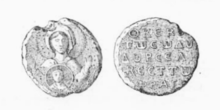Roussel de Bailleul
Roussel de Bailleul (died 1077), also known as Phrangopoulos (literally "son-of-a-Frank"), or in the anglicized form Russell Balliol was a Norman adventurer (or exile) who travelled to Byzantium and there received employ as a soldier and leader of men from the Emperor Romanus IV (ruled 1068–71). He is also known as Ursellus de Ballione in Latin or Roscelin or Roskelin de Baieul, and Anna Comnena called him Ourselios, also rendered Urselius.

Roussel was possibly a Frank, but certainly ventured with the Apulian Normans to Italy, settled in Terra d'Otranto and served under Roger de Hauteville in Sicily. According to Geoffrey Malaterra, Roussel distinguished himself with his bravery at the Battle of Cerami, where he urged Count Roger to pursue the fleeing Saracens. Aside from this brief account by Malaterra, The Alexiad of Anna Comnena is the main source for Roussel.
He was present at the Campaign of Manzikert in 1071, but did not participate in the battle, as he was previously dispatched by the Emperor Diogenes to Khliat to forage and plunder.[1] After the disaster, he was kept in imperial service, where good generals were needed, and was sent into Asia Minor again with a force of 3,000 Franco-Norman heavy cavalry. There Roussel conquered some territory in Galatia and declared it an independent state in 1073, with himself as prince, following the example set by his fellow Normans in the Mezzogiorno. His capital was Ankara, now the capital of Turkey. He defeated the Caesar John Ducas and sacked Chrysopolis, near Constantinople. He even supported a usurper candidate, but by formally ceding lands that the Seljuk Turks had actually conquered, the emperor Michael VII persuaded the Seljuk warlord Tutush I to remove Roussel. However both Ducas and Roussel were defeated and captured by Turkish forces, fortunately for Roussel his wife was able to pay the ransom demanded by the Turks allowing Roussel to return to Amasea, where the population so loved him that he made himself undisputed governor. He was given up by the people through a ploy of Alexius Comnenus (1074), then a general, later an emperor.
In 1077, he was released (for a ransom) from his Constantinopolitan imprisonment to lead a battalion against the rebel Nicephorus Botaniates. He defeated him handily, but then played the traitor and joined him. This time, the emperor called up the Seljuks again and they defeated and captured him at Nicomedia. He was given over to Byzantium and executed.
References
- Kaldellis, Anthony (2017). Streams of Gold, Rivers of Blood (1 ed.). New York: Oxford University Press. p. 246. ISBN 9780190253240.
Sources
- Norwich, John Julius. The Normans in the South, 1016–1130. London: Longmans, 1967.
- Gravett, Christopher, and Nicolle, David. The Normans: Warrior Knights and their Castles. Oxford: Osprey Publishing, 2006.
- Schlumberger, Gustave (1881). "Deux chefs normands des armées byzantines au XIe siècle: Sceaux de Herve et de Raoul de Bailleul" (PDF). Revue Historique. 16: 289–303.